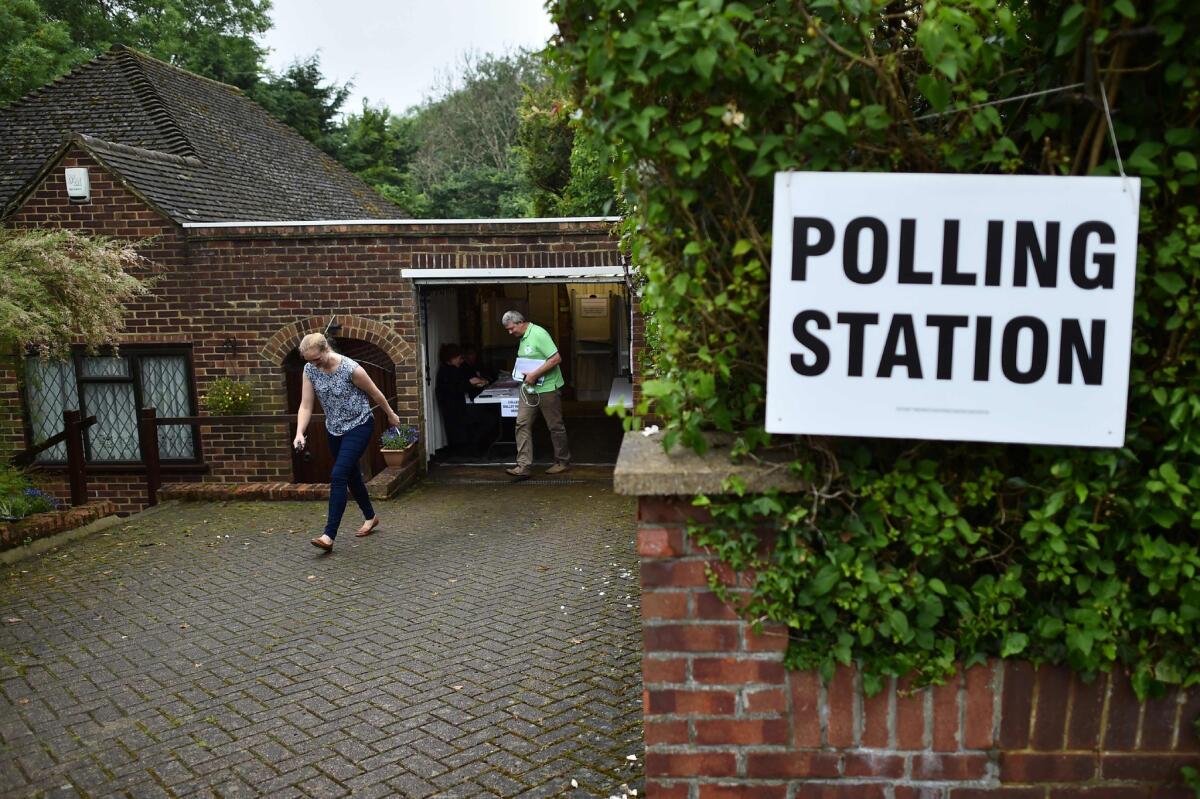The voting ends and the counting begins as Britain decides whether to leave the European Union

Reporting from London — Voters across Britain headed to the polls Thursday for a referendum on whether to stay in the 28-nation European Union in what many consider the nation’s most important decision in years.
If a majority of voters cast their ballots to leave the EU partnership, there would be political, economic and social changes for Britain and the member nations as well as global ramifications. Supporters say Britain would be in a better financial position, but opponents say the potential problems outweigh any benefits.
The results of the vote are not expected until Friday morning at the earliest. Polling data ahead of the vote indicated it would be close.
There was no exit polling as officials and pollsters said the accuracy would be questionable, and a news blackout in Britain that began Thursday morning lasted until polls closed at 10 p.m.
Sealed ballot boxes were being transported to counting venues across the country.
Earlier, despite rainy and gray weather, there was a long line of people waiting to vote on the issue known as Brexit at the Gospel Oak Methodist Church in north London, which was not the case last month for the London mayoral election.
“I think this referendum is really important,” said Anna Solemani, wearing a “Remain” sticker on her rain slicker. “I want to stay in and this is the most passionate I have ever been for an election or referendum.”
In the London neighborhood of Chelsea, pensioner Jo Davis said she voted to leave because “I think we have had such a muddle with immigration.”
The EU began after World War II to generate economic cooperation and avoid war. The debate on whether it’s time for Britain to break away has generated fears about uncontrolled immigration and other problems if the “Remain” camp wins and a virtual economic collapse if the “Leave” camp wins.
See more of our top stories on Facebook >>
A decision for Britain to leave the EU would give the country about two years to negotiate its exit strategy.
Jean-Claude Juncker, the European Commission president, warned that there would be no further negotiations of the country’s relationship with the EU if British voters decided to leave, saying Wednesday that “out is out.”
The referendum has been a highly contentious issue for months, with both sides claiming their statistics and predictions are correct and accusing the other side of inaccuracies and lies. The BBC even set up the “Reality Check” page on their news website in a bid to fact-check all the claims made by both sides.
The campaign experienced tragedy last week as lawmaker Jo Cox, a Remain supporter, was killed by a man who reportedly shouted “Britain First” before shooting and stabbing the 41-year-old mother of two. Britain First, a far right political group, denied any involvement in the slaying.
If Britain votes to leave the EU, it would have to renegotiate its relationship with the countries still in the partnership and other nations. The Leave camp, headed by former London Mayor Boris Johnson, said Britain would be better off financially because all the money the country contributes to the EU would remain in British coffers and could help boost the internal economy.
Those in the Remain camp — led by British Prime Minister David Cameron and supported by former Prime Ministers Tony Blair and John Major — have stated that leaving could have negative effects on long-term economic growth, housing prices, jobs and the general standard of living.
The two most contentious issues tied to the referendum have been immigration and the economy.
Britain is part of the single EU market, which means no trade tariffs on imports and exports within the union. If voters decide to leave, trade deals with EU countries and others like the U.S. would need reworking. President Obama said on a visit to London in May that if Brexit passes, the country would be put “in the back of the queue” when it came to trade deals. Experts believe that France, Belgium and possibly Germany would reject any moves by Britain to remain within the European single market without at least an agreement that European citizens could continue to work and live in the country.
The immigration issue largely stems from the number of European Union citizens who have come to live and work in Britain and can collect benefits.
The Leave argument has been that people from poorer countries have flooded Britain during the last several years and Britain has lost control of its borders. According to the Office of National Statistics, net migration to the country was 330,000 in 2015 and 184,000 coming from within the EU.
The Remain camp counters that EU migrants contribute to the growth of the country and many work in jobs that many British citizens do not want, including as builders, cleaners and nannies.
“As it happens, if we left the EU, nothing would change in terms of our international obligations towards refugees,” said Robert Hazell, a professor of government and constitution at University College London.
ALSO
Where the world stands on gay rights
Iran’s economy is running just fine — if you’re a bigwig at a state-owned company
It would take 1,166 Dodgers Stadiums to hold everyone displaced by violence and persecution
UPDATES:
3 p.m.: This article has been updated with the polls closing and additional information.
This article originally published at 7:27 a.m.
More to Read
Sign up for Essential California
The most important California stories and recommendations in your inbox every morning.
You may occasionally receive promotional content from the Los Angeles Times.










